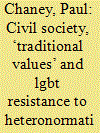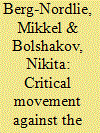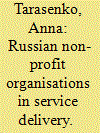| Srl | Item |
| 1 |
ID:
160196


|
|
|
| 2 |
ID:
160203


|
|
|
|
|
| Summary/Abstract |
This essay analyses how the ‘foreign agent’ law has been interpreted and implemented by the Russian authorities and examines diverse NGO survival strategies in response to the ‘foreign agent’ label. The foreign agent law has disrupted and transformed resource mobilisation strategies and transnational NGO networks. Based on qualitative research on environmental NGOs, we offer a typology of NGO responses to the foreign agent law, providing examples to show how the organisations attempt to ensure their survival.
|
|
|
|
|
|
|
|
|
|
|
|
|
|
|
|
| 3 |
ID:
160204


|
|
|
|
|
| Summary/Abstract |
This study of lesbian, gay, bisexual and transgender rights in the Russian Federation uses frame analysis of civil society input into the UN Universal Periodic Review. It reveals a stark state–civil society ‘disconnect’ reflecting oppressive government practices, including Law No. 135-FZ on ‘non-traditional sexual relations’. This raises wider questions about the efficacy of the review system, not least because issues of performativity and legitimation can be seen to facilitate authoritarian resilience. This allows the ruling elite to continue to dissemble by espousing universal rights yet strategically framing them as heteronormative, integral to the protection of ‘traditional values’ and inimical to identity-based rights claims.
|
|
|
|
|
|
|
|
|
|
|
|
|
|
|
|
| 4 |
ID:
160200


|
|
|
|
|
| Summary/Abstract |
After the 2011–2012 electoral protest cycles, the opportunity structures for a broad range of non-governmental organisations (NGOs) have been narrowed. This essay argues that increased control over NGOs mirrors a deeper conflict of governance models, which is endogenous to the Russian political system, between bureaucratic modernisation and patronal politics. The modernisation sought by the Kremlin under Medvedev’s term brought a greater demand for organisations capable of fulfilling the dual purpose of public communication and state advisory functions. This required clear legal definitions, areas of competence and rules of conduct. However, patronal politics dictate that NGOs should bow to the state, and be governed by diffuse principles of loyalty.
|
|
|
|
|
|
|
|
|
|
|
|
|
|
|
|
| 5 |
ID:
160205


|
|
|
|
|
| Summary/Abstract |
In 2010, Russian authorities presented a new draft law on education, which immediately became controversial. The essay examines whether user groups (parents) and low-ranking sector employees (teachers) were active in the movement critical of the reform, and how the state responded to the anti-reform movement. The movement consisted of several networks and organisations with no central node. It included teachers, parents and activists from both non-systemic groups and systemic opposition parties. Pressure from below by networks and organisations was combined with pressure from actors situated above in the political system, that is, in the Duma. Since the movement was welfare-oriented rather than fundamentally regime-critical, the Russian authorities tolerated open criticism both from civil society and inside the Duma. Some gains for teachers were won, but the movement’s proposed amendments and demands were generally rejected or only introduced in revised form.
|
|
|
|
|
|
|
|
|
|
|
|
|
|
|
|
| 6 |
ID:
160199


|
|
|
|
|
| Summary/Abstract |
In present-day Russia, the government’s approach towards the non-profit sector is in many ways ambivalent and contradictory. The Russian government follows two opposing strategies: it largely suppresses independent and potentially critical NPOs, while at the same time co-opting those that function in line with government priorities. The essay analyses the ways in which NPOs have perceived the dual nature of governmental policies and how these policies have affected the non-profit sector in Russia’s regions. The essay argues that, by creating divisions between different types of NPOs, government policies have exerted a negative influence on the internal solidarity of the Russian non-profit sector.
|
|
|
|
|
|
|
|
|
|
|
|
|
|
|
|
| 7 |
ID:
160202


|
|
|
|
|
| Summary/Abstract |
The essay investigates the survival strategies of foreign-funded Russian non-governmental organisations (NGOs) in the face of the so-called ‘foreign agents’ law of 2012. Conceptualising NGOs as autonomous social systems and drawing on two qualitative case studies of Russian NGOs in the fields of human rights protection, we show how these organisations manage to cope with the state’s withdrawal of legitimacy by creatively handling their diverse environmental dependencies. Through shifting the relative importance of different audiences and generating new sources of legitimacy, they have eventually created and maintained small supportive ecologies within the overall environment of a political regime that does not tolerate them.
|
|
|
|
|
|
|
|
|
|
|
|
|
|
|
|
| 8 |
ID:
160197


|
|
|
|
|
| Summary/Abstract |
The essay examines the social policy principles underlying state funding schemes that shape the functioning of non-profit organisations in service delivery in Russia. Scrutinising federal and regional financial tools, the analysis reveals that some non-profit organisations are engaged with a neoliberal logic promoting state funding based on competitive grant processes and a means-tested approach to clients, while others seek privileged access to state resources to secure a statist and stratified service provision for their members. The essay argues that neoliberal principles are extended through contracting-out and are undermining statist practices; however, a situation is emerging within competitive outsourcing procedures in which selected organisations are still receiving privileged treatment from the state.
|
|
|
|
|
|
|
|
|
|
|
|
|
|
|
|